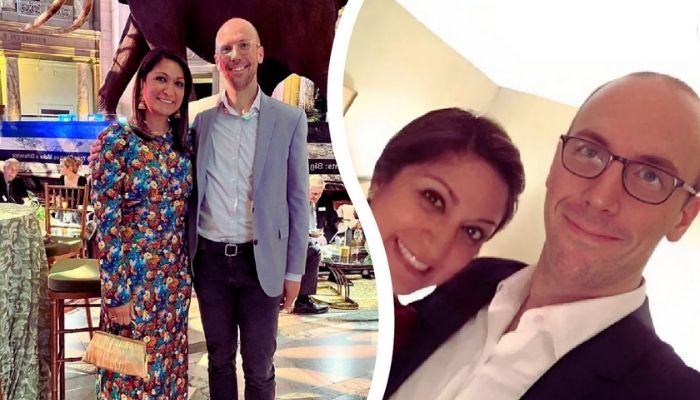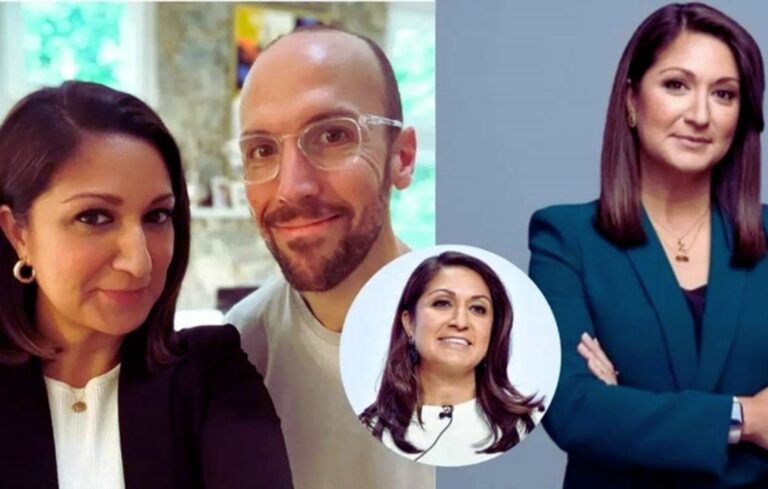In the world of journalism, where the spotlight often shines brightly on those delivering the news, it’s easy to overlook the stories of the people working behind the scenes. One such person is Paul Werdel, a man who has made significant personal sacrifices to support his wife, Amna Nawaz, co-anchor of the PBS NewsHour. While Amna Nawaz has made history as the first Asian American and Muslim American to anchor a nationally broadcast evening news program, it’s important to recognize the role Paul has played in her success.
Paul Werdel’s journey, from a career in journalism to becoming a full-time parent, is a story of love, partnership, and the evolving dynamics of modern family life. His decision to step back from his professional pursuits to support his family challenges traditional gender roles and highlights the importance of mutual respect in a partnership. This article takes an in-depth look at Paul Werdel’s life, career, and the pivotal role he has played in supporting his wife and children.
Early Life and Career
Before becoming a full-time parent, Paul Werdel was an accomplished journalist with a thriving career in digital media management. Like many of today’s top media professionals, Paul cut his teeth in the bustling media landscape of New York City. His tenure at The New York Times stands out as one of the most significant periods of his career, where he played an essential role in the newspaper’s transition into the digital era.
At The New York Times, Paul was involved in developing and expanding the paper’s digital platform. This was a time when traditional journalism was facing challenges from new digital competitors. His work helped bridge the gap between traditional news and the evolving digital landscape. In an era when newspapers were struggling to adapt to the rise of online media, Paul’s expertise in digital journalism and product management made him an invaluable asset.
His ability to navigate this complex digital transformation positioned him as a forward-thinking journalist, but as he would soon learn, personal and family priorities were about to take center stage in his life.
A Supportive Decision
The turning point in Paul Werdel’s life came in 2018, when his wife, Amna Nawaz, joined PBS NewsHour as a correspondent and later became the co-anchor of the nationally broadcast program. Recognizing the demanding nature of Amna’s career, Paul made a life-changing decision: he stepped back from his professional career to focus on raising their two daughters.
This was no small decision. Stepping away from a successful career in journalism is a sacrifice that many would find difficult to make, but Paul did so out of a deep sense of commitment to his family. By choosing to take on the primary role of caregiver for their children, he enabled Amna to focus on her rapidly rising career without the added pressure of managing the household and child-rearing responsibilities on her own.
This decision reflects the modern dynamics of family roles, where traditional gender lines are increasingly being blurred. In many ways, Paul Werdel’s story is emblematic of a broader shift in how families are managing work-life balance, particularly in dual-career households.
The Impact of a Supportive Partner
Paul’s decision to prioritize his family had a profound impact on Amna Nawaz’s career. With her husband’s unwavering support, Amna was able to focus on her work, eventually becoming a pioneering figure in journalism. She made history as the first Asian American and Muslim American to co-anchor a national evening news broadcast, a significant achievement that might have been far more difficult without Paul’s presence at home.
The importance of a supportive partner in high-stakes careers cannot be overstated. Amna’s rise to prominence came with its fair share of challenges, including long hours, travel, and the pressure of breaking new ground in a field that still lacks diversity. However, Paul’s decision to take on the primary responsibilities of raising their children gave Amna the space to focus on her demanding career, secure in the knowledge that her family was in good hands.
While Paul’s contributions may not be as visible as Amna’s achievements on screen, they are no less important. Behind every success story, there is often someone who has made sacrifices to ensure that success, and in this case, Paul Werdel is the unsung hero.
Redefining Family Roles
Paul Werdel’s role as a stay-at-home father challenges traditional gender stereotypes. For generations, men have been expected to prioritize their careers, with child-rearing responsibilities typically falling on women. However, Paul’s decision to put his family first and allow his wife’s career to take precedence reflects a new paradigm in family dynamics.
In recent years, more men have embraced the role of primary caregiver, a shift that is reshaping what it means to be a father and partner. Paul’s choice not only defies conventional expectations but also serves as an example of how modern families are evolving to adapt to the demands of dual-career households.
As a stay-at-home father, Paul’s daily life involves managing the countless tasks that come with raising children, from preparing meals to overseeing schoolwork, all while ensuring the household runs smoothly. His decision to take on these responsibilities allows Amna to pursue her passion and career goals, highlighting how successful careers and family life can coexist with the right support system.
By redefining these roles, Paul Werdel demonstrates that there is no one-size-fits-all approach to family life. His willingness to take on the duties traditionally associated with mothers shows that true partnership is about flexibility, mutual respect, and shared goals.
Paul Werdel’s Legacy and Influence
Paul Werdel’s story is not just one of personal sacrifice; it’s a story of mutual respect and partnership. His decision to prioritize family over career ambitions is a powerful example of what it means to support a spouse in their professional journey. In a world where careers often demand long hours and intense focus, the importance of a strong support system at home cannot be understated.
While Paul may not be in the public eye as much as his wife, his influence is deeply felt. His willingness to challenge traditional gender roles and take on the role of primary caregiver has paved the way for a redefinition of modern fatherhood. In many ways, Paul is a role model for fathers who seek to be more present and engaged in the upbringing of their children.
Furthermore, his story serves as a reminder that success is rarely achieved in isolation. Behind every successful person is a network of support, and in the case of Amna Nawaz, Paul Werdel’s contributions have been integral to her success.
Conclusion
Paul Werdel’s story is a testament to the power of supportive partnerships in high-stakes careers like journalism. His decision to step back from his career and focus on raising his children has not only redefined his family’s dynamics but has also played a pivotal role in the success of his wife, Amna Nawaz. By challenging traditional gender roles and embracing the responsibilities of fatherhood, Paul has shown that true success is a collaborative effort, built on mutual respect and shared goals.
In an era where work-life balance is often elusive, Paul Werdel’s story stands as an inspiring example of how modern families can adapt to meet the demands of both personal and professional life. While he may not be in the public eye, his impact is undeniable, proving that success is not just about individual achievements but about the strength of the partnerships that make them possible.

